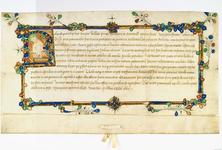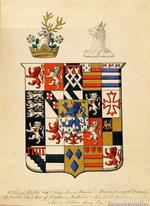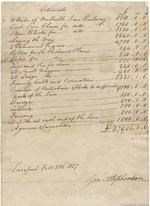The first recorded Hulton to live in Lancashire was Blethyn de Hulton, who emigrated from North Wales in the second half of the twelfth century after Owen Gwynedd had successfully expelled Norman and English settlers from the region. Blethyn's son, Jorweth, was granted by charter the town of Penelton by King John in 1199. The family quickly expanded its influence locally, and in 1304 Richard de Hulton held parts of Hulton, Ordsall, Flixton and Heaton. The same Richard also built the first Hulton Hall, establishing the family seat on the Hulton Park estate, which consisted of 325 acres of parkland located approximately five kilometres south-west of Bolton. However, Richard's grandson, also Richard de Hulton, squandered much of his family's estate and died in poverty without an heir.
The Hultons spent much of the fifteenth and sixteenth centuries regaining and expanding the property they held, often through marriage. For instance, in 1485, Adam Hulton and Alice Hulton, daughter of John Hulton of Farnworth, were arranged to be married while still in their infancy. In 1521, Henry VIII had to arbitrate in the resultant dispute between the two branches of the Hulton family, ruling that lands in Westhaughton, Harpurhey, Denton, Openshaw and Gorton should be assigned to Adam and Alice's male heirs. From this point onwards the Hultons of Hulton Park became much more prominent than their namesakes from Farnworth.
In 1452, Deane Chapel, close to Hulton Park, was completed. Henry VIII granted a charter establishing the parish of Deane in November 1541, meaning the Chapel was now a Church (DDHU 10/1). Here, the Hultons practised their faith and many family members are buried in its Hulton Chapel. The Hultons were devout Catholics, and initially resisted the forces of the Reformation, as did much of Lancashire. Despite this, they generally remained faithfully allied to sovereign power; William Hulton, for example, in 1585 joined the association of Lancashire magistrates committed to defending Elizabeth I in the Anglo-Spanish War. William's successor and grandson, Adam Hulton, was a convert to Protestantism, and developed numerous connections with Puritan families in the area. There is little doubt that the Hulton family were involved in the Civil War of 1642-51, as Adam summoned his tenants to Parliament's cause. It is also possible that Adam played an active role in the conflict himself. A January 1643 letter addressed to George Rigby of Peel, Clerk of the Peace for Lancashire, informs us that Rigby's brother-in-law, 'Captaine Hilton', was kept prisoner in Chester Castle after acting as a captain in the Parliamentary army (DDKE/HMC/191). 'Captaine Hilton' could refer to either Adam or his brother, Edward.
The accession of Adam's son, William, coincided with the onset of the era, stretching from the late seventeenth to late nineteenth centuries, in which the Hulton's wealth and influence was at its height. William briefly represented Clitheroe in the Convention Parliament of 1660 which invited Charles II to return to the throne, and would be the only member of the family to ever sit in the House of Commons. He also was responsible for the construction of the second incarnation of Hulton Hall (DDHU ACC 9301/22). The family maintained its local influence throughout the eighteenth century, even if distinguished individuals or noteworthy events were lacking.
The Hultons accrued much of their wealth by means of the coal which lay beneath their estate. The coal was mined from at least as early as the 1550s, but its true economic worth only became clear when the process of industrialisation which transformed so much of Lancashire began to take hold in the late eighteenth and early nineteenth centuries. William Hulton, who inherited the family estate in 1800, was responsible for many of the major developments which allowed for the full exploitation of the coal mines in Hulton park. He was one of the principal supporters of the Bolton and Leigh Railway scheme, which would allow Hulton coal to be easily transported to the markets of Bolton, Manchester and Liverpool. The railway pioneer, George Stephenson, stayed at Hulton Hall for a period of three months during the process of estimation and construction which he oversaw. The line was eventually opened for traffic on 1st August 1828, with as many as 40,000 people in attendance to witness what the Bolton Chronicle described as an 'interesting and novel spectacle' (DDHU ACC 9301/106). The Bolton and Leigh Railway predated the Manchester and Liverpool Railway by 2 years, making it the first railway line to operate in Lancashire. In 1858, William Hulton founded the Hulton Colliery Company in partnership with Harwood Walcot Banner. This partnership was dissolved ten years later and from 1868 onwards the company traded under the Hulton name only. The Hultons gave up direct control over the management of the coal mines in 1886 after the Hulton Colliery Company Ltd. was founded. In December 1910 a defective safety lamp caused an explosion in the 'Pretoria Pits' which claimed the lives of 344 men and boys. The incident was the worst coal mining disaster to occur in Lancashire, and the third worst to occur in Britain. By 1947, the Hulton coal empire could claim to be the largest in Lancashire, but it was gradually diminished in the second half of the twentieth century due to a nationwide fall in demand for coal.
In addition to their economic wealth, the Hultons also occupied various positions of political influence during the eighteenth and nineteenth century. From 1767-1775, Henry Hulton, a member of the extended family who previously resided in Hampshire, fulfilled the role of First Commissioner of Customs in American Colonies in Boston. This meant he was responsible for ensuring unpopular taxes levied on the American population were collected. Many locals hated the system they denounced as 'taxation without representation', and Hulton himself was reviled and subject to physical attack on numerous occasions. Having inadvertently playing his part in the onset of the American Revolution, Hulton retired to England in 1776 (DDHU ACC 9301/35). The other Hulton whose actions were to have major political significance was the aforementioned William Hulton, who was appointed High Sheriff of Lancashire in 1811. It was in this capacity that he was forced into action after a cotton mill in Westhoughton was torched by Luddites in 1812. Hulton ordered that four of the suspects, one of them reported to be just twelve years old, be executed. This decision and others in years to come cemented Hulton's reputation as a magistrate who would deal with working-class crime and social unrest severely. The most clear example of this, and perhaps the incident for which the Hultons are most remembered today are the events of 16th August 1819. 60,000 pro-democracy reformers had gathered in St Peter's Field, central Manchester, to listen to the famous radical orator, Henry Hunt. In 1819 Hulton had been appointed chairman of the Lancashire and Cheshire magistrates, a body set up to deal with the growing problem of civil unrest. He was therefore in attendance at the meeting to ensure order was maintained. Observing from a nearby house, Hulton issued an arrest warrant for Hunt and some of his associates, but was advised that military assistance would be required to allow for this. Hulton therefore called on local yeomanry, who having completed the arrests, were then ordered by Hulton to disperse the meeting. In a scene of blind panic, the yeomanry began to attack the crowd indiscriminately. It is estimated that 18 were killed and 600 to 700 injured as a result, and the event became popularly known as the 'Peterloo Massacre'. Home Secretary Lord Sidmouth conveyed King George III's 'great satisfaction' at Hulton's 'prompt, decisive and efficient measures' (DDHU 53/76), but among the working classes, to whom he was henceforth known as 'old Peterloo', his reputation was forever sullied (DDHU 53/76). For this reason, in 1820 he felt obliged to turn down a safe Tory seat in Parliament (DDHU 53/61), while as late as 1841 Hulton and his family were attacked in Bolton during an election campaign (DDHU 53/81). This demonstrates the importance of the Peterloo Massacre in influencing public opinion: the martyrdom that resulted undoubtedly aided the efforts of those in favour of democratic reform.
The late nineteenth and twentieth century history of the Hulton family can be characterised by gradual decline. Sir William Rothwell Hulton was the last Hulton patriarch to live in Hulton Hall, opting to move into a cottage on the estate towards the end of the First World War. Hulton Hall had long been in a state of disrepair before its eventual demolition in 1958 at the behest of Sir Geoffrey Hulton. Geoffrey served as an Officer in the Royal Navy Marines on board HMS Repulse during the Second World War. He was held as a Japanese prisoner of war for some three and a half years, during which he 'lived in the depths of squalor'. (DDHU ACC 9301/3) Geoffrey's death without heir in 1993 signalled the end of the over eight hundred years old Hulton dynasty.






